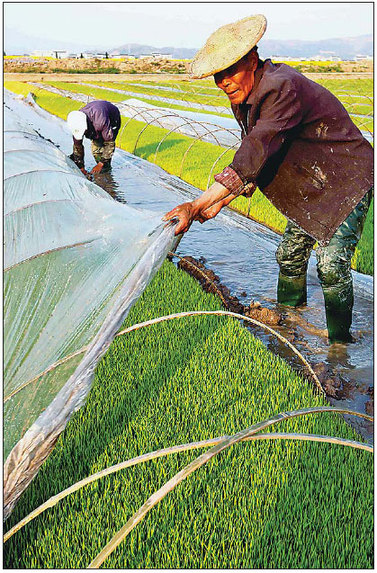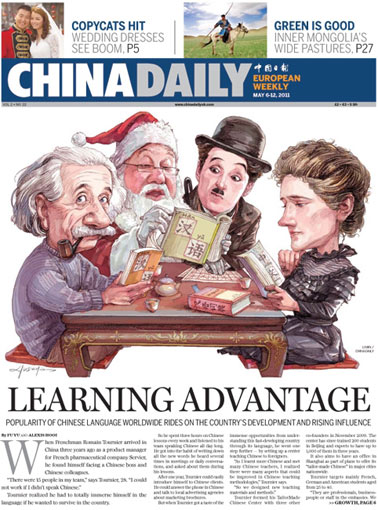Society
Going green the hard way
Updated: 2011-05-02 07:09
By Xu Junqian (China Daily)
But why would NetEase itself want to diversify by getting into, of all things, the pig business? Well, Ding is personally concerned about food safety. It all started during a casual dinner at a hotpot restaurant in Chongqing in 2008, when Ding was shocked at the sight of the color of the pig blood used in a dish that was a delicacy back home. The unusual appearance aroused his suspicions about how the pigs had been raised.
Meanwhile, in Shanghai, four women working in the same office, all of them mothers, have put all of their leisure time and savings into an organic farm in a village near Shanghai, which provides the produce that feeds their families and the families of hundreds of other working mothers.
And, over in Wenzhou, Zhejiang province, home to many self-made millionaires and daring entrepreneurs, agriculture - the very foundation of China's economy for centuries, at least until the reforms of 1980 - is making a comeback as the darling of many industrial pioneers.
City government statistics show that, during 2010, Wenzhou had more than 500 manufacturers who had put a total of 6 billion yuan into agriculture. It is widely believed that growing food safety concerns might create a growing demand for "green" produce selling at a premium price at supermarkets around the country
But, for Shen, the decision had nothing to do with money. It was more visceral. He decided to return home after hearing about how the infant daughter of a close friend had died of cancer - because of a bad diet.
"It struck me like a thunder bolt. I was planning to get married at that time and I didn't want to lose anyone dear to me because of tainted food."
Then, one evening as he was driving home through Beijing's heavy traffic, he thought about his rustic roots back at the family farm and made up his mind right then and there: "I wanted to raise my family in the security of my own village."
|
Modern farming methods, with their reliance on pesticides and chemicals, have caused concern about food safety among the younger generation. |
His parents were of a different mind. They had retired and objected vigorously to the idea of his returning, arguing that they had spent their life savings sending him to university so that he could find a decent job in the city - certainly not to come back and labor at the farm. They simply could not understand why he wanted to give up what he had fought so hard to get.
"I knew it'd be tough. We don't have government support or sufficient capital. We're doing it all by ourselves," he said.
And he lost his vegetables a few times to pests, but he steadfastly refused to give in to pesticides: "It's organic or nothing at all."
Shen remembers the most frustrating moment one suffocatingly hot summer day, when he drove two hours to a market in downtown Hangzhou to sell his first crop of Chinese lettuce, only to find that the ordinary version, treated with pesticides and chemicals, was going for such a low price, no more than 1 yuan a kilo, that there was no way people would touch his.
When Shen got home, he told his wife to just leave all the lettuce in the field to rot. "At least it would be used as fertilizer," he explained.
After that, Shen learned to be more tactful in selling his produce, by, for example, recommending it to members of online health clubs or peddling it in rich neighborhoods.
"Business is picking up, even if it's at a very slow pace," Shen says philosophically.
And, sometimes customers stop by to place an order because produce deliveries cannot be guaranteed, on account of the weather or lack of experience.
In fact, 30 families stop by regularly, once a week, to put in an order, and Shen delivers his vegetables door-to-door every Friday from his Volkswagen, the only asset he has from his busy Beijing days.
Shen thinks he will have 60 families as steady customers by the end of the year, and 90 or more by 2012.
The most difficult part of this life, Shen says, has been the problem of finding someone to help him with the farm work. Most young people are like his "former self", busily making money in the big city, while the elderly farmers still there in the countryside are not strong enough to do the heavy work.
"Anyway, being a farmer isn't really a glamorous thing, generally speaking. And I don't want to force an idea that even my parents can't accept on others. Besides, I don't have that much money," is how Shen puts it.
That lack of help is a major obstacle for the business. Only a third of his land is under cultivation, even though his disapproving parents have offered to lend a helping hand.
"If it were fully used, the land I leased could be worth 2 million yuan a year, and that could be a successful business mode, one that could attract more young people," he said, with his tan face and surprisingly optimistic tone.
But, after all, he attributes that accepting attitude to the peaceful, contented life that the hard work has brought him.
E-paper

War of the roses
European Chinese rose growers are beating their Chinese rivals at their own game
High-tech park gets big boost
At the source
Merchant of Venice
Specials

Sino-US Dialogue
China and the US hold the third round of the Strategic and Economic Dialogue on May 9-10 in Washington.

Drunk driving
Drunk drivers face a detention for one to six months and a revokation of their drivers' license.

V-Day parade
A military parade marking the 66th anniversary of the Soviet victory over Nazi.

